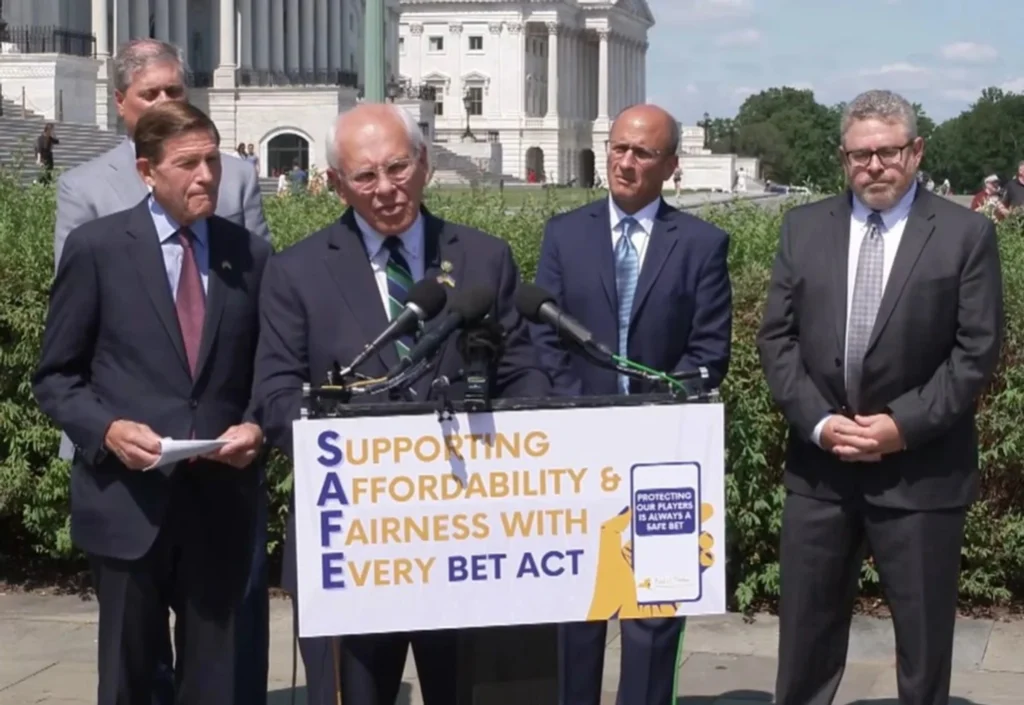Federal Sports Betting Framework Back in Focus
A fresh attempt to implement a federal framework for sports betting is on the horizon in the United States. Congressman Paul Tonko and Senator Richard Blumenthal have announced a press conference on Tuesday, 11 March, to reintroduce the Supporting Affordability and Fairness with Every Bet Act (SAFE Bet Act).
Originally introduced on 12 September 2024, the SAFE Bet Act is one of two sports betting proposals currently being discussed on Capitol Hill. The legislation aims to introduce stricter regulations on digital sports betting, with a strong focus on public health and responsible gambling measures.
Public Health Approach to Sports Betting Regulation
The press conference will also feature families impacted by gambling addiction and representatives from the Public Health Advocacy Institute at Northeastern University School of Law. They will discuss the legislation’s potential impact, highlighting its public health-driven approach.
Key provisions of the SAFE Bet Act include:
- A nationwide self-exclusion list for problem gamblers.
- A report from the US Surgeon General detailing the public health risks associated with sports betting.
- Authorisation for the Substance Abuse and Mental Health Services Administration to collect and analyse nationwide data on sports betting trends and their effects.
Nationwide Sports Betting Prohibition?
One of the most controversial elements of the SAFE Bet Act is its proposal for a nationwide prohibition on sports betting. This is a significant shift, as the authority to regulate sports betting has rested with individual states since the repeal of the Professional and Amateur Sports Protection Act (PASPA) in 2018.
Since PASPA’s repeal, 39 US states have legalised sports betting, with 38 already operational. Missouri is set to join the market by 1 December 2025.
The legislation would require states to seek approval from the federal government before offering sports betting. States would need to submit an application to the US Attorney General demonstrating compliance with a set of federal requirements. These applications would be valid for three years, though the draft proposal does not mention any application fees.
Legal experts have previously questioned whether such a proposal would stand up to scrutiny, given that PASPA’s repeal returned regulatory power to the states.
Strict Advertising Restrictions and AI Ban
The SAFE Bet Act also introduces a strict advertising framework, including:
- A ban on sports betting adverts between 8am and 10pm on broadcast platforms.
- Prohibitions on the use of certain words and phrases in gambling marketing.
- Stricter affordability checks for bettors in specific circumstances.
- A ban on AI-driven tracking of gamblers’ behaviour.
Competing Federal Proposal: The GRIT Act
The SAFE Bet Act is not the only federal sports betting measure in circulation. Another proposal, the Gambling Addiction Recovery, Investment, and Treatment Act (GRIT Act), is also under discussion in Washington.
Unlike the SAFE Bet Act, the GRIT Act seeks to redirect a portion of the federal excise tax on betting towards problem gambling initiatives. The National Council on Problem Gambling has voiced support for this measure. Meanwhile, Nevada Representative Dina Titus has introduced legislation aimed at repealing the federal excise tax altogether.
Tuesday’s press conference marks the third time that Tonko and Blumenthal have attempted to push the SAFE Bet Act forward. However, a formal bill has yet to be filed. The coming weeks will determine whether this latest push gains momentum in Congress.



